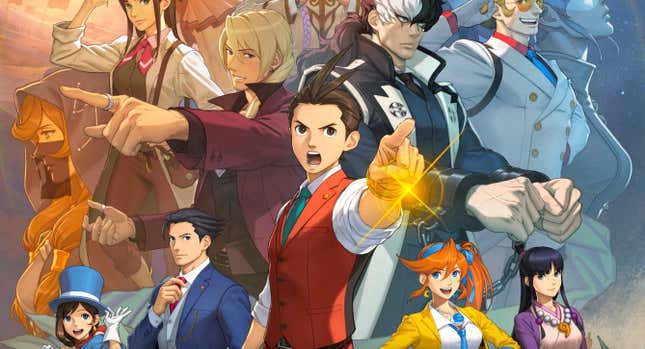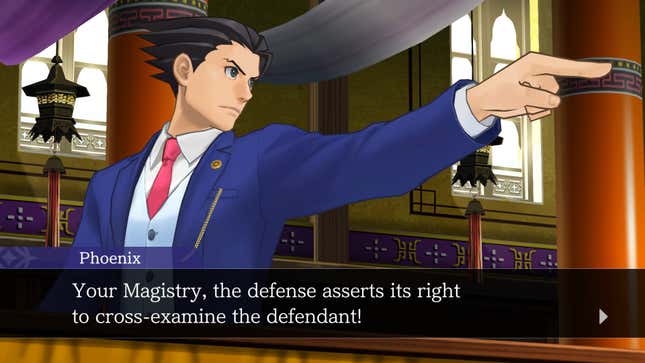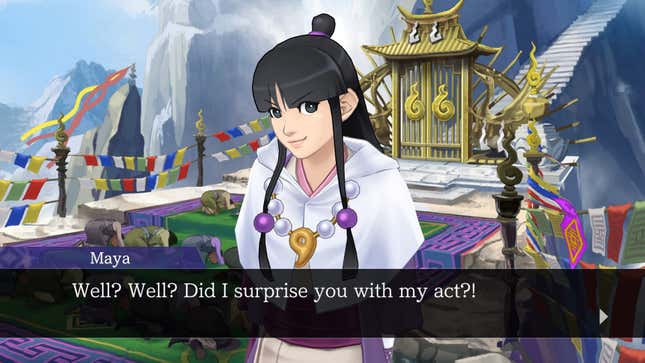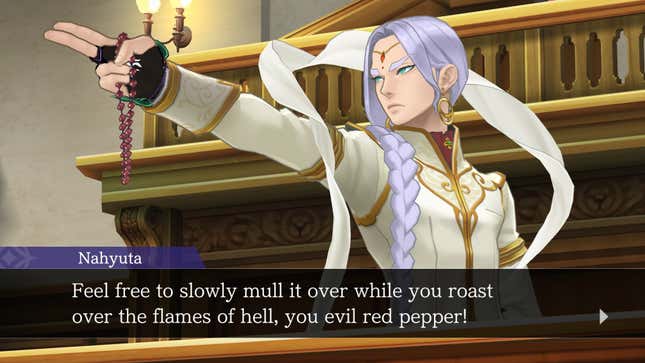
In the fall of 2001, an unprecedented incident shook the world—the first Gyakuten Saiban (or Ace Attorney) game launched in Japan for Game Boy Advance. You played as greenhorn attorney Ryūichi Naruhodō (later translated to Phoenix Wright) as he bluffed through legal cases by exploiting testimonial contradictions, presenting tenuous evidence, and shouting a bunch. Capcom would release two more games in the series for the Game Boy Advance exclusively for Japanese audiences.
In 2005, Ace Attorney made its global debut via the Nintendo DS console. English-speaking audiences got a visually updated and expanded version of the first game, which began an ongoing cycle of remasters. With each one, the Ace Attorney fan base has grown exponentially. As of September 2023, the franchise has sold more than 10 million units.
Part detective story, part courtroom drama, the world of Ace Attorney is more exaggerated and silly than our own. It’s also earnest, idealistic, and absurdly funny. But humor is a notoriously tricky thing to translate. Even so, the series’s wholesome goofiness has won over fans around the world, thanks in no small part to the stellar efforts of Capcom’s localization team.
“Simply by being kinder to one another, the world of the English Ace Attorney games became a very different one from ours indeed,” says longtime localization director Janet Hsu.
This month, another batch of Ace Attorney games are getting a fresh coat of paint. Apollo Justice: Ace Attorney Trilogy, compiles the series’ fourth through sixth games: Apollo Justice, Dual Destinies, and Spirit of Justice. Ahead of the launch, Hsu spoke with Kotaku to reflect upon their time working on the series, its sprawling cast of loveable weirdos, and its growing popularity.
Hsu, who uses they/them pronouns, joined the franchise in 2005 and has been part of the localization team for every game since 2007’s Justice for All. They entered the localization world by chance, and when they joined Capcom nearly 20 years ago, the division was just starting out. At that time, games often tried to obscure their Japanese origins to make things more palatable to English-speaking audiences. For example, while the Japanese version of Ace Attorney takes place in modern Japan, the 2005 localization team set it in Los Angeles, without altering culturally specific references like food and architecture. Over time, it’s become a version of Los Angeles where Japanese culture has blossomed, and is now affectionately known as Japanifornia by fans of the series.

But that’s far from the only example of the English localization team’s impact on the series’ identity. Each localization choice has had a far-reaching ripple effect throughout the franchise. Since Naruhodo was renamed Phoenix in the 2005 English translation, Hsu says that Greek naming motif also carried over to sequel protagonists Athena and Apollo.
“With the main character of the first trilogy being named after a legendary bird, we had to go big for Apollo as well. Apollo is a god connected with the sun and truth, which fits his personality well. Similarly, Athena was also chosen for her god status and connection to justice, wisdom, and fighting spirit,” Hsu explains.
Japanese pop culture and media has become far more popular overseas in the years since the games in this collection debuted. “Had this trilogy been localized into English today, the localization might be slightly different, but I assumed people would only become more and more familiar with Japanese culture,” Hsu says.
In that spirit, some elements of the games just never made sense to localize, because there wasn’t a suitable equivalent. “I frequently used the word “yokai,” and the demon Tenma Taro remained Tenma Taro in the localization of The Monstrous Turnabout,” Hsu says of the fifth installment of the series, 2013’s Dual Destinies. “I didn’t try to turn the rakugo storyteller aspect into a more Western idea of a stand-up comedian, for example.”

Unsurprisingly, jokes are especially difficult to localize. In the original text, Ace Attorney games (like many Japanese series) often use the phrase “yare, yare” or “good grief” as a punchline. “With a well-placed ‘yare, yare,’ the heavy lifting of the humor in the punchline is done by the reader,” says Hsu of the original Japanese script. Conversely, English audiences expect more obvious jokes. For that reason, “most yare, yare’ lines are translated into a snarky, sarcastic remark in English because of this difference in language and culture.” says Hsu.
Hsu also takes advantage of the flexibility found in non-Japanese languages to add nuance to dialogue. For example, Spirit of Justice features an English-original quirk where the Khura’in judge says “Peace!” instead of “Silence!” According to Hsu, “It’s fun to add a little more flavor to a specific character or to show that things are done a little differently in Khura’in.”

Although the English translation of Apollo Justice Trilogy has been unaltered, numerous new translations were completed for the 2024 release, including French, German, Korean, and Simplified and Traditional Chinese. Hsu oversaw every new translation alongside Chester Kurusu, Capcom’s Asian Languages Lead. In addition to localizing, Hsu took an active role in guiding the game’s asset upgrades and aesthetics.
“Because I worked on the original DS and 3DS versions, I was able to help make decisions on how to expand things for the new 16:9 console experience,” says Hsu. They considered trimming the game picture in certain places, as they had with 2021’s Great Ace Attorney Chronicles, but this would’ve resulted in some odd imagery, like Simon Blackquill’s pet bird, Taka, having his head just out of frame. Like many recent Capcom titles, such as Dragon’s Dogma 2, Street Fighter 6, and Exoprimal, Apollo Justice Trilogy uses the powerful RE Engine. Hsu and the programmers worked together to utilize this engine in a way that that kept the experience intact.
As for the series’ future, Hsu says, “I would love to see more Ace Attorney content in any form. We’ve had an anime, a live-action movie, multiple stage plays, orchestra concerts, and so much more in addition to the games,” says Hsu.
With the Apollo Justice: Ace Attorney Trilogy, fans can now play every mainline Ace Attorney game on modern consoles. However, the spin-off games starring Prosecutor Miles Edgeworth have been left in the dust. Only the first one, Ace Attorney Investigations: Miles Edgeworth, is officially available and translated.
Hsu, like many fans, hopes this will change someday soon: “Of course I want it [an official Ace Attorney Investigations 2 translation] to happen! Hopefully, before I grow old and have to retire!”
Apollo Justice: Ace Attorney Trilogy is out now on Nintendo Switch, PlayStation, Xbox, and PC.
.